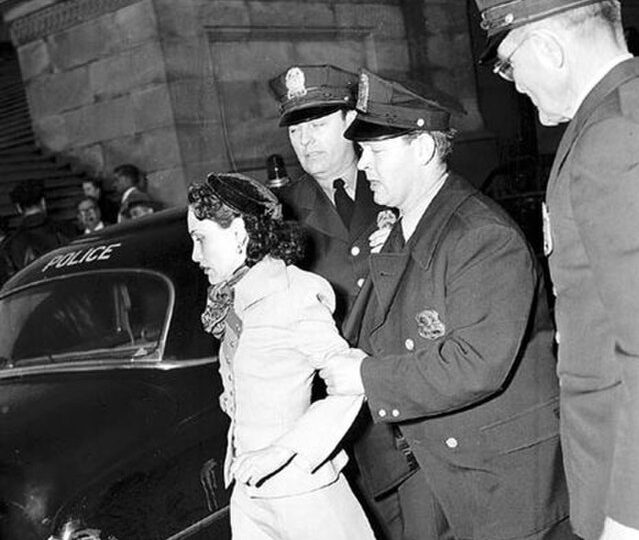On March 1, 1954, four people made their way to the Capitol while the House was in session. Climbing up to the gallery, they sat down and waited. At the mark of their leader, they stood and opened fire down onto the House floor. Amid the ensuing chaos, some representatives ducked for cover while others scrambled to disarm the assailants. Shouts of Viva Puerto Rico Libre rang in the air. Later, the New York Times reported that “Not since the British burned the Capitol in August, 1814, had there been such an incident there.”
The four assailants were detained and identified as Lolita Lebron, Rafael Cancel Miranda, Andres Figueroa Cordero and Irvin Flores Rodriguez. None of them resisted the arrest or showed remorse over the five congressmen who were injured in the shootout. While the three men were convicted of assault with intent to kill and given a sentence of 25 to 75 years, Lolita Lebron was sentenced to 16 to 50 years: she alone had fired at the ceiling. The presiding judge referred to their crime as “so heinous, so infamous, so daring and atrocious as to have shocked the conscience of the Nation.”
As the leader, Lebron was prepared to shoulder the blame alone. She told the court she had been willing to die that day, even if the majority of Puerto Ricans did not agree with her cause. A note found in her purse spelled out her motive, stating that “the United States of America are betraying the sacred principles of mankind in their continuous subjugation of my country, violating their rights to be a free nation and a free people in their barbarous torture of our apostle of independence, Don Pedro Albizu Campos.”
Four years earlier, in 1950, President Truman had authorized Puerto Ricans to establish a constitution to grant the island a new degree of autonomy, including an elected governor, a government of the commonwealth, and a new judicial system. The new constitution was accepted in a referendum. Despite overwhelming popular support, the Nationalist Party denounced the Commonwealth Bill for reaffirming US rule over the island, and Pedro Albizu Campos, a revolutionary and the leader of the party, incited unrest around Puerto Rico in protest. After being incarcerated, he continued to correspond with his followers. In November 1950, two Nationalist Party members attempted to assassinate President Truman in Washington D.C. During the firefight with Blair House guards, one assailant was killed and the other, Oscar Collazo, was imprisoned for life. Lebron claimed that her orders, too, had come directly from Albizu Campos and that the attack on the Capitol was only a part of larger plot, which would include an attack on President Eisenhower.
When the four Nationalist became eligible for parole, they refused to apply for it. Lebron knew the rules of parole would limit her political activities. In the 1960s and 1970s, her name became a rallying cry for anti-imperialists, young Puerto Rican nationalists, and other radicals of the era who admired her resilience. Campaigns for her release grew prominent and the criticism persistent. President Jimmy Carter, a promoter of human rights in US foreign policy, heard the criticism loud and clear. The Puerto Rican prisoners were a point of inconsistency that was pointed out by both his political enemies and advisors, such as Robert Pastor, a member of the National Security Council, who wrote: “I am struck at how pathetic these cases are (…) I believe that the risks of releasing them unconditionally are minimal, while the benefits – as a humanitarian, compassionate gesture – are considerable.” He went on to argue that such a move might boost the president’s profile in Puerto Rico. However, it was not a straightforward decision to make. Lebron and her accomplices were notorious and it was feared that were Lebron set free, she might continue her mission or inspire others to follow in her footsteps.
Humanitarian concerns may not have held enough sway, but in the end, the decisive factor came from elsewhere. Several US citizens with connections to the CIA had been imprisoned in Cuba for espionage and counterrevolutionary activities, and securing their release had been on the agenda for years. In 1975, Fidel Castro had suggested a simultaneous freeing of prisoners, but the US had refused due to the seriousness of the Nationalists’ crimes and because their release was deemed too dangerous. Castro refused to exchange other political prisoners, however, and would only agree to Lebron. As public pressure grew and all three remaining prisoners were found to have clear conduct records, the president was convinced that the threat their release might pose was outweighed by the symbolic value of the gesture. On September 10, 1979, Jimmy Carter released Lebron, Rafael Cancel Miranda, Irvin Flores and Oscar Collazo. On September 17, Fidel Castro freed four American prisoners who had been detained for almost fifteen years.
Lolita Lebron never accepted compassion as the reason behind her release and believed it was done solely for political expediency. Doña Lolita, as she was known in Puerto Rico, passed away in 2010. She never committed the acts of terrorism many had feared she would, but neither did she sit still. She was an activist who, at 81 years old, was arrested for protesting an American military base in the Puerto Rican island of Vieques. Although she remained an unwavering advocate for independence, she traded violence for civil disobedience. In 1998, she stated that “there is no need now to kill for freedom.”
This piece was written using the following collections available at the RIAS:
The New York Times
The Declassified Documents Reference System



